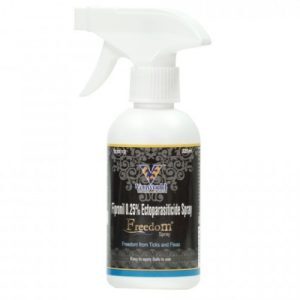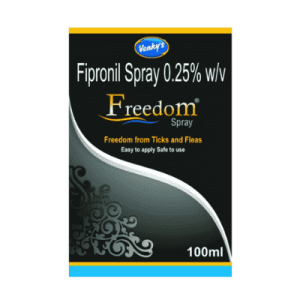Table of Contents
Freedom Spray, also known as Fipronil, is an insecticide commonly used to control a wide range of pests, including fleas, ticks, ants, cockroaches, and termites. It belongs to a class of chemicals called phenylpyrazoles and acts by disrupting the central nervous system of insects, leading to their death.

What Is Freedom Spray (Fipronil)?
Freedom Spray is a top choice of Fipronil product. It is available in various formulations, including sprays, spot-on treatments, and granules. It is widely used in both agricultural and residential settings for pest control. Agriculture often uses it to protect crops from pests such as aphids, beetles, and caterpillars.
When used as a spot-on treatment for pets, the medicine is typically applied to the skin between the shoulder blades, where it spreads and provides protection against fleas and ticks.
While the medicine is generally considered safe and effective when used as directed, handling it carefully and taking necessary precautions to minimize exposure is essential. It is toxic to aquatic organisms and can harm bees and other beneficial insects. Therefore, avoiding contaminating water sources and using the product responsibly is important.
Ingredients
Many people ask: What ingredients are in Fipronil, and Is Fipronil organic?
It consists of:
· Fipronil – 0.25% w/v (2.5g/lit);
· Excipients – q.s.
Forms of Fipronil
It is available in different formulations to suit various applications. Here are some common forms of medicine.
Spray
It is often formulated as a spray, which can target pests directly or treat surfaces where pests are present. Sprays are typically available in aerosol cans or trigger sprayers for convenient application.
Liquid
It can be formulated as a liquid concentrate, diluted with water, and applied using sprayers or other suitable equipment. Liquid formulations are commonly used for larger-scale applications, such as agricultural pest control or treating large outdoor areas.
Granular
It is also available in granular form, where the active ingredient is embedded into tiny granules. Fipronil granular formulations are commonly used in lawn care and pest control, where the granules are spread over the affected area or applied to the soil to target pests like ants, termites, or grubs.
Powder
It may also be formulated as a powder, which can be used for various purposes. Powdered formulations are often used in agricultural settings, where they can be mixed with other substances or applied directly to crops to control specific pests.
Fipronil’s specific form and concentration may vary depending on the intended use and the manufacturer.
Uses of Freedom Spray
Freedom Spray is commonly used for pest control purposes. Here are some situations and pests where Freedom Spray may be used:
- Fipronil for fleas and ticks on pets: It is often used as a spot-on Fipronil flea treatment for dogs and cats to control fleas and ticks. It is typically applied between the shoulder blades of the animal, and it protects against these pests for a certain time.
- Indoor use: Freedom Spray can control various indoor pests such as ants, cockroaches, and spiders. It can be applied as a spray directly on the surfaces where these pests are found or expected to be present, such as along baseboards, cracks, and crevices.
- Outdoor pest control: Freedom Spray in granular or liquid form can be used for outdoor pest control. It can be applied to lawns, gardens, or other outdoor areas to target pests like ants, termites, grubs, or other crawling insects.
- Agricultural pest control: It is also used in agricultural settings to protect crops from pests such as aphids, beetles, and caterpillars. It may be applied as a spray or used in other formulations suitable for agricultural use.
Consider the specific pest you target and any local regulations or guidelines related to pesticide use.
Who Can Use the Spray?
Always read the product labels and follow the instructions provided by the manufacturer when using any pesticide or insecticide.
Fipronil for Dogs
Spot-on treatments or sprays specifically formulated for dogs are intended for use on dogs only. These products are designed to be applied to the skin between the shoulder blades or as directed by the product instructions. They should not be used on cats, as they may contain concentrations of the active ingredient that can be toxic to felines.
Spray for Cats
Can Fipronil be used on cats?
Fipronil sprays formulated for cats are intended for use on cats only. These sprays are typically used to control fleas and ticks on cats and should not be used on dogs or other animals unless explicitly stated on the product label.
Fipronil for Humans
It is not intended for direct use on humans. While the medicine is considered safe for pets when used as directed, it should not be applied to human skin. If you have concerns about pests or insects affecting your health or living environment, it is advisable to consult pest control professionals or healthcare providers. They can recommend appropriate solutions for human use.
Dosage Sizes
The specific instructions for using Freedom Spray, or any product containing Fipronil, can vary depending on the intended use. Here are some general guidelines of this product for dogs, how much and how often to apply:
Fipronil for Dogs and Cats
If you are using a spot-on treatment or spray for your pet, follow these steps:
- Check the product’s recommended age and weight range to ensure it suits your pet. Do not exceed the recommended Fipronil dosage for cats and dogs or the frequency of application.
- Apply the product to the recommended area on your pet’s skin, typically between the shoulder blades or as directed on the product label. Part the fur and apply directly to the skin, ensuring it does not come into contact with the pet’s eyes, mouth, or open wounds.
- The duration of effectiveness may vary depending on the product, so refer to the instructions for information on how frequently you need to reapply the product to maintain its efficacy. Follow the recommended reapplication intervals to ensure continued protection.
Indoor or Outdoor Pest Control
If you are using Freedom Spray for indoor or outdoor pest control, follow these guidelines:
- Identify the target pests and the areas where they are present or likely to be found.
- Shake the spray bottle or mix the appropriate concentration of liquid or granules with water according to the instructions on the product label.
- Apply the spray or solution evenly on surfaces or areas where pests are present, following the recommended application rate and coverage.
- Depending on the severity of the infestation, you may need to reapply the spray periodically or as directed on the product label. This ensures continuous protection and control of pests.
Always use personal protective equipment (PPE), such as gloves and masks, if recommended on the product label. Also, ensure proper ventilation when spraying indoors and avoid spraying near food preparation areas.

Important Safety Information for Owners
When using Freedom Spray, it’s essential to prioritize safety. Here are some important safety guidelines and considerations for pet owners:
- Follow the recommended application methods, dosage, and frequency of use.
- Ensure you use the correct formulation of Freedom Spray designed for your pet’s specific species and size. Products meant for dogs should not be used on cats, and vice versa. Using the wrong product can be ineffective or potentially harmful.
- Consult a veterinarian if you have concerns or questions about using Freedom Spray on your pet.
- When applying Freedom Spray to your pet, ensure it does not come into contact with their eyes, mouth, or open wounds. If accidental exposure occurs, rinse thoroughly with water and seek veterinary advice.
- Pets should not ingest or lick the applied area immediately after application. Restrict their access to the treated area until the product has dried or been absorbed, as ingestion can lead to potential adverse effects.
- After applying Freedom Spray to your pet, observe them for any signs of adverse reactions such as excessive salivation, vomiting, diarrhea, tremors, or other unusual behavior. If any concerning symptoms occur, contact a veterinarian immediately.
- Keep Freedom Spray and all pesticides securely stored in a location inaccessible to pets and children. Follow any specific storage instructions provided on the product label.
- Avoid contaminating water sources with Freedom Spray or other pesticides, such as ponds, lakes, or streams. Respect any guidelines or regulations concerning the disposal of unused products or empty containers.
- If you have concerns about using chemical-based products, you may explore alternative pest control methods or consult professionals specializing in natural or non-toxic pest control options.
Remember, the safety and well-being of your pet should always be a top priority. If you have any uncertainties or questions about using Freedom Spray or any other products, seek advice from professionals, such as veterinarians or pest control experts, who can provide personalized recommendations based on your specific situation.
Veterinary Prescription
In most cases, you do not need a veterinary prescription to purchase Freedom Spray for routine pet care. Fipronil-based spot-on treatments and sprays for dogs and cats are typically available over the counter at pet supply stores, veterinary clinics, or online retailers.
However, it’s always advisable to familiarize yourself with the local regulations and guidelines concerning the purchase and use of veterinary products in your area.
Additionally, while you may not need a veterinary prescription to purchase Freedom Spray, it is generally recommended to consult a veterinarian before using any new products on your pet.
Contraindications
Freedom Spray may have contraindications or precautions that pet owners should be aware of. Here are some common contraindications and precautions associated with Freedom Spray:
- Hypersensitivity or Allergic Reactions: Some pets may have hypersensitivity or allergic reactions to active ingredient or other ingredients in the product. If your pet has a known allergy or sensitivity to Fipronil or similar products, avoiding using Freedom Spray and seeking alternative treatments is essential.
- Age and Weight Restrictions: Freedom Spray products may have specific age and weight restrictions. Ensure you select a product appropriate for your pet’s age and weight range. Using products designed for larger animals on smaller or younger pets can lead to overdosing and potential adverse effects.
- Pre-existing Health Conditions: Pets with pre-existing health conditions, such as liver or kidney disease, or those receiving other medications or treatments, may have a higher risk of adverse effects from Freedom Spray.
- Pregnancy or Nursing: It is generally recommended to avoid using Fipronil products on pregnant or nursing pets unless specifically directed by a veterinarian. Some formulations may have safety concerns for the developing fetus or nursing young, so professional guidance is essential.
- Other Medications: If your pet takes any medications, inform your veterinarian before using Freedom Spray. Certain medications may interact with the drug, potentially altering their efficacy or causing adverse reactions. Your veterinarian can guide potential drug interactions.
- Species-Specific Use: Freedom Spray products formulated for dogs should not be used on cats, and vice versa. Using the wrong product for the species can lead to ineffective pest control or toxicity.
These are general considerations; specific contraindications or precautions can vary depending on the product, concentration, and individual pet’s health.
Side Effects
While Freedom Spray is generally considered safe and effective when used as directed, side effects may be possible. Here are some potential side effects that have been reported:
- Some pets may experience localized skin reactions at the application site, such as redness, itching, or irritation. These reactions are typically mild and temporary. If severe or persistent, consult with a veterinarian.
- In rare cases, pets may experience gastrointestinal upset, including vomiting or diarrhea, after applying Fipronil flea products. If these symptoms persist or worsen, seek veterinary advice.
- It acts on the nervous system of insects, and in rare instances, pets may exhibit temporary neurological effects. These effects may include tremors, uncoordinated movements, or hyperactivity. Contact a veterinarian immediately if you observe any abnormal behavior or neurological symptoms.
- While uncommon, some pets may develop an allergic reaction to the drug or other ingredients in the product. Signs of an allergic reaction can include swelling, hives, difficulty breathing, or collapse. If your pet exhibits any of these symptoms, seek emergency veterinary care.
The occurrence of side effects with products with Fipronil is generally rare. However, if you notice any unexpected or concerning symptoms in your pet after using Freedom Spray, discontinue use and consult a veterinarian.
Overdose
An overdose of Freedom Spray can lead to adverse effects in pets. If you suspect an overdose or accidental ingestion of Freedom Spray, take the following steps.
If you suspect an overdose, contact a veterinarian immediately. They can provide guidance based on your pet’s specific situation and advise on the necessary steps. When speaking with the veterinarian, please provide them with details about the product, the amount used or ingested, and any observed symptoms or changes in your pet’s behavior.
While waiting for veterinary advice, closely monitor your pet for any signs of adverse effects. Symptoms of an overdose may include excessive salivation, vomiting, diarrhea, tremors, seizures, or other abnormal behavior. If your pet exhibits any concerning symptoms, seek veterinary care immediately. The veterinarian will provide guidance based on the severity of the situation. They may recommend inducing vomiting, administering activated charcoal, or supportive care to manage any potential adverse effects.
Fipronil Poisoning
This medicine poisoning in pets can occur if they are exposed to or ingest high concentrations of the drug. While it is generally safe when used as directed, it can be toxic if consumed in large quantities.
If a pet accidentally ingests the medication, it can lead to poisoning. This can happen if they lick or chew on treated areas or surfaces or consume an excessive amount of the product.
Symptoms of poisoning in pets can vary depending on the amount ingested and the individual animal’s sensitivity. Common signs may include vomiting, diarrhea, excessive salivation, loss of appetite, lethargy, tremors, uncoordinated movements, seizures, and in severe cases, collapse or coma.
If you suspect poisoning in your pet, it is crucial to seek immediate veterinary care. Contact your veterinarian or an emergency veterinary clinic for guidance. Time is of the essence in treating poisoning cases.
The treatment for poisoning will depend on the severity of the symptoms and the amount ingested. The veterinarian often induces vomiting or performs gastric lavage to remove the toxin from the stomach. Activated charcoal may also help bind the toxin and prevent further absorption. Supportive treatment, such as intravenous fluids and medications, may be necessary to control symptoms.
To prevent toxicity in pets, follow the product’s instructions carefully and store the drug securely and out of reach of pets.
Storage
What is the shelf life of Fipronil?
Follow proper storage guidelines to ensure its effectiveness and safety.
Store Freedom Spray in a cool, dry place. High temperatures and humidity can degrade the product’s effectiveness and cause changes in its chemical composition. Avoid storing it in areas exposed to direct sunlight or extreme temperature fluctuations, such as near windows or heaters.
Keep Freedom Spray in a secure location that is out of reach of children and pets. Store it in a locked cabinet or on a high shelf to prevent accidental access or ingestion. It is generally recommended to store Freedom Spray in its original container with the label intact. The original container is designed to protect the product from external factors and prevent leakage.
Store Freedom Spray away from food, beverages, or animal feed to prevent accidental contamination. Additionally, ensure that the product does not come into contact with water sources or other chemicals that may compromise its quality.
Generic and Brand Names of Freedom Spray (Fipronil)
Fipronil is the generic active ingredient in various insecticides and flea and ticks control products available under different brand names. Other names for Fipronil for flea and tick control in pets include:
- Frontline: Frontline is a well-known brand that offers spot-on treatments and sprays containing Fipronil for dogs and cats.
- Certifect: Certifect is a brand that provides spot-on treatments containing Fipronil along with an additional ingredient for enhanced tick control.
- Effipro: Effipro is a brand that offers spot-on treatments and sprays containing Fipronil for dogs and cats.
- PetArmor: PetArmor is a brand that offers spot-on treatments and sprays containing Fipronil for dogs and cats.
These are just a few examples of brand names that include the same active ingredient. Availability and brand names can vary by region and country.
Other Drugs in the Same Class
What class is Fipronil? What kind of chemical is Fipronil?
It belongs to a class of insecticides known as phenylpyrazoles. While it is primarily used in veterinary products for flea and tick control, there are a few other drugs in the same class as this product. These include:
- Fluralaner: Fluralaner is an insecticide and acaricide used in veterinary products for flea and tick control. It is available in oral chewable formulations for dogs and cats.
- Afoxolaner: Afoxolaner is an insecticide and acaricide used in veterinary products for flea and tick control. It is available in oral chewable formulations for dogs.
- Sarolaner: Sarolaner is an insecticide and acaricide used in flea and tick control veterinary products. It is available in oral chewable formulations for dogs.
These drugs target the nervous system of fleas and ticks, leading to their elimination or prevention of infestations. However, it’s important to note that each drug may have specific characteristics, indications, and safety considerations, so it’s essential to consult with a veterinarian to determine the most appropriate treatment for your pet.
This is not an exhaustive list; other drugs within the same class as this medicine may not be mentioned here. Consulting a veterinarian will provide the most up-to-date information on available flea and tick control options.
Comparing Fipronil to Other Active Ingredients
|
Active Ingredient |
Class |
Mode of Action |
Targeted Pests |
Common Use |
|
Fipronil |
Phenylpyrazole |
Nervous system disruption |
Fleas, ticks |
Veterinary flea control |
Bifenthrin |
Pyrethroid |
Nervous system disruption |
Various pests |
Agricultural, residential |
Methoprene |
Insect Growth Regulator |
Inhibits larvae development |
Fleas |
Flea control products |
Borax |
Mineral compound |
Dehydrates insects |
Limited efficacy against fleas |
Homemade/natural remedies |
Indoxacarb |
Oxadiazine |
Nervous system disruption |
Fleas, certain insects |
Veterinary flea control |
Dinotefuran |
Neonicotinoid |
Nervous system disruption |
Fleas, ticks |
Veterinary flea control |
FAQ
Who makes Fipronil?
It is a generic active ingredient used in various insecticides; different manufacturers produce it. Some well-known brands that use it in their products include Venkys, Frontline, Certifect, Effipro, and PetArmor.
Is Fipronil an acid?
No, it is not an acid. It is a white crystalline solid that belongs to the phenylpyrazole chemical class.
How long does it take for the spray to work?
The time it takes for a spray to work can vary depending on the specific product and the targeted pest. These products typically start working within a few hours after application. However, it may take up to 24-48 hours to see the full effect, as the product needs time to spread across the insect’s body and disrupt its nervous system.
How much does the medicine cost?
Prices can range from a few dollars to higher amounts for larger packages or specialized formulations. It is best to check Fipronil reviews and buy at online retailers for sale at the best price or veterinary clinics for current pricing information.
How safe is Fipronil for cats and dogs?
It is generally considered safe for cats and dogs when used according to the manufacturer’s instructions. However, as with any medication or insecticide, there are potential side effects or adverse reactions. Use the appropriate product for the specific species (dog or cat) and carefully follow the recommended dosage and application instructions.
Can Fipronil kill cockroaches, scabies, and flea eggs?
Yes, the medication is effective against various pests, including cockroaches, certain mites like scabies, and flea eggs. It disrupts the nervous system of these pests, leading to their elimination. However, the specific product and formulation may have varying efficacy against different pests.
Is Freedom Spray an insect growth regulator?
Freedom Spray is an insecticide commonly used to control a wide range of pests, including fleas, ticks, ants, cockroaches, and termites.
Can I use Fipronil for cats on my dog?
It is essential to use a product specifically formulated for the intended species. Fipronil products for cats and dogs have different concentrations and formulations tailored to their needs. Using a product labeled for cats on a dog, or vice versa, may result in an inappropriate dosage, which can be potentially harmful.
Olivia Bennet is a veterinarian who has worked in a veterinary clinic for many years. She specializes in the diagnosis, disease prevention, and treatment of not only cute kittens and puppies but also large farm animals. Olivia loves animals, cares about them, and wants to help you know more about your pets.

































